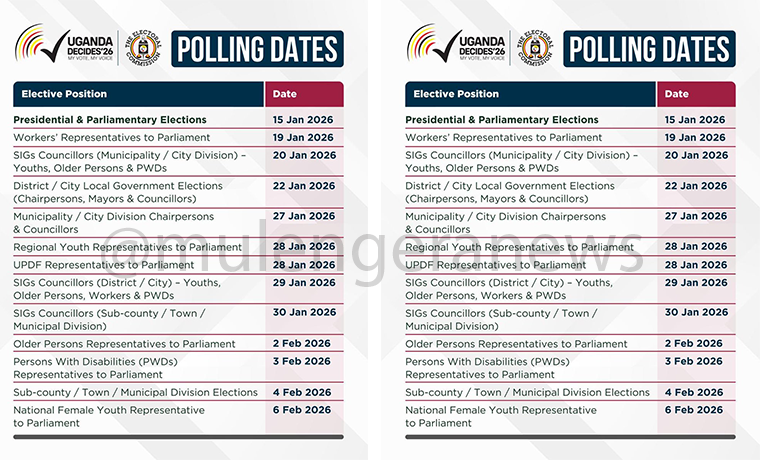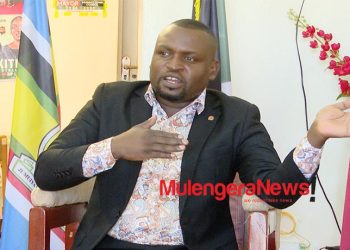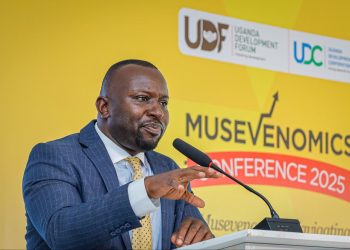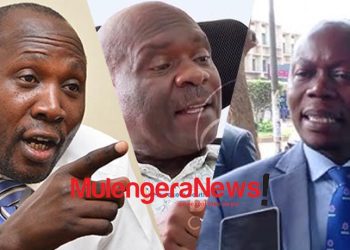By Our Reporters
In a recent interface with the media at PPDA headquarters in Nakasero, the Authority ED Benson Turamye opened up like never before and discussed the monster called corruption in the public procurement processes. Turamye was speaking after earlier speakers including his Capacity Building Director Moses Ojambo whose presentation disclosed that 10% of the eventual price paid out per contract goes into gratifying the officials concerned in the contracting PDE. Quoting the 2016 PPDA perception survey, Ojambo disclosed that more than 50% of the contractors and service providers interviewed confessed ever gratifying concerned officials in order to get the contract. The respondents also estimated to have lost 10% of whatever amount they are eventually paid for each job they are contracted to do in any of the government PDEs. On average, more than 100,000 contracts are annually given out by the 360 government MDAs and Ojambo says excessive corruption and bribe solicitations is the reason many would-be credible contractors and service providers have stopped bidding for government jobs, something PPDA hopes to mitigate through Florence Nakyeyune’s eGP (e-government procurement) project. Of the Shs26trn in our FY2017/18 budget, Shs18trn (69%) is spent on public procurements by entities like UNRA and others. Turamye says public procurement is only followed by debt servicing in number two when it comes to expenditure under the FY2017/18 budget. This is the reason he believes Ugandans must become interested and vigilantly participate in aiding regulator PPDA’s efforts to stamp out corruption in the public procurement space.
CLASSIFIED EXPENDITURE;
Prompted by New Vision’s John Kakande and Daily Monitor’s Tabu Butagira, in his presentation, Turamye addressed the question of classified by defense and other security forces because the public perception is that this is where most of the procurement corruption occurs. Turamye explained that even when it’s supposed to be classified procurement, PPDA isn’t totally absent or excluded. He said Section 42 of the PPDA Act requires that the lists of classified suppliers and service providers are annually shared and agreed upon between PPDA and the security agencies. Turamye said the agencies have been compliant as PPDA has regularly interfaced with them to vet and scrutinize the lists to ensure minimum suitability requirements are meant to ensure value for money. Turamye said the Defense Ministry, Police, ISO and ESO practice this selective restricted bidding and PPDA is represented by two senior staffers in ensuring value for money in these processes.
These two senior PPDA staffers include the ED and one other member of staff, Turamye disclosed. “The problem is that PPDA is excluded by law and can’t audit transactions done under classified procurement but the good news is that the Office of the Auditor General does,” Turamye explained. He also decried the inappropriate practice by some government PDEs that claim to be authorized to do classified procurements yet the law is very clear restricting that to clearly designated security agencies. Journalists, who clearly never expected Turyame to freely discuss this aspect of procurement, were quick to chorus “Parliament” when the ED spoke of entities that sometimes claim to carry out classified expenditure even when the law clearly doesn’t include them.
The newsmen and women prompted Turamye to discuss the controversial security equipment procurement that saw hundreds of millions of Parliamentary money being surrendered to police under the guise of procuring electronic security equipment. The matter involved the office of the Speaker and that of IGP who was then Gen Kale Kayihura. Turamye didn’t seem comfortable to at length discuss that matter and scribes didn’t push him hard after all, there are many other things he and his top management team had already disclosed to them.
The PPDA officials also warned agencies that sometimes try to abusively apply for accreditation to procure certain items withoutvgoing through open bidding method of procurement. Saying some of them abusively apply for such accreditation even when it’s not necessary, Moses Ojambo gave the example of National Housing and Posta Uganda as some of the entities that have previously been accredited to procure certain things directly without open bidding. We separately asked Ojambo to explain why NSSF that has for long been applying for similar accreditation when procuring things stipulated in their investment plans has never been authorised and he said “their application is under consideration.”
This news website is reliably informed that NSSF would like to escape open competitive bidding for investment transactions e.g. when purchasing land to erect say apartments. Whenever people involved in the property market hear its NSSF wanting to buy, they will connive to speculatively hike the price because they know NSSF is a cash cow having the money yet once permitted to confidentially negotiate with a particular seller, the same property could be procured at a price that maximizes value for money for the NSSF members/savers.

Turamye also reflected on the challenges PPDA faces when trying to insist on best procurement practices in grand public works involving Chinese funding. John Kakande had raised a question wondering whether projects like Karuma, Isimba or even the Entebbe Express Highway (which are funded with Chinese loans that come with a lot of conditions including apredetermined contractor) are subjected to the same PPDA law mandating PPDA to ensure all the procurement principles which Ojambo had earlier on elaborated upon in a rich presentation to the media team.
Turamye also sensitized the media leaders on the complaints mechanism available to an aggrieved bidder saying this is one way through which the would-be corrupt practices have comprehensively been mitigated against. Any dissatisfied bidder can appeal to the accounting officer of that PDE and if dissatisfied with the decision, he/she can appeal to PPDA for administrative review. Thereafter in case of dissatisfaction, the aggrieved party can appeal to the judge-headed 5 member procurement Tribunal which sits at Communications House for the final determination of the matter. Even after here, some parties have proceeded to the High Court or even the IGG but Turamye said, because of the prudence with which such complaints are considered, the Tribunal has rarely overturned decisions or findings of the PPDA Administrative review process.
The tribunal can even award costs to the successful appellants. The appeals process is timely at every stage; whereby the entity appealed to must make a decision within stipulated time lines as opposed to dragging on forever. To increase transparency in the public procurement space, Turamye begged the media to become interested in regularly publishing procurement plans for the different entities so that the public can participate in scrutinizing the same.
He also talked about frame work contracts which PDEs are permitted to have with service providers like hotels in case they must have emergency procurement of hotel services to have say meetings or workshops. He said this as part of the broad answer he gave to social media icon Sarah Kagingo who had asked about the propriety of MDAs going on a spending spree in the last days and weeks of the financial year simply because they are avoiding having to return the unspent monies to the Consolidated Fund. For comments, call/text/whatsapp us on 0703164755!
































